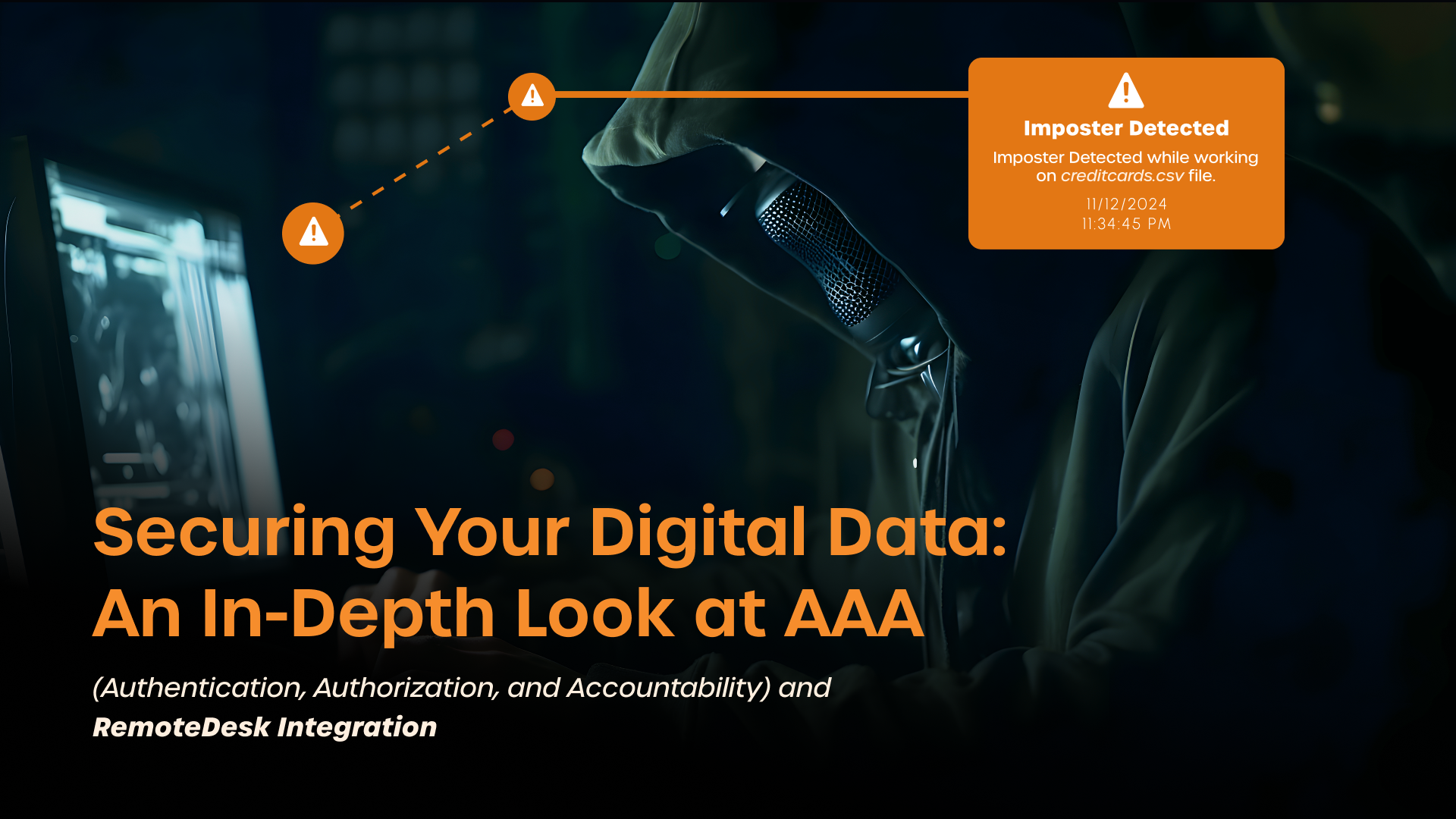Securing Your Digital Data: An In-Depth Look at AAA (Authentication, Authorization, and Accountability) and RemoteDesk Integration

Summary
By understanding and implementing AAA, organizations can ensure secure access to their resources, maintain detailed records for accountability, and comply with regulatory requirements.
In the realm of data security, the AAA framework—Authentication, Authorization, and Accountability—is essential for controlling and monitoring user access to resources. This blog will delve into each component of AAA, explore common protocols, and highlight the unique security features of RemoteDesk, an AI-powered solution for enterprise data security and compliance management.
Let’s explore the concept of AAA Security Framework
AAA stands for Authentication, Authorization, and Accountability, a standard-based framework used to manage and secure user access within a network. These components work together to ensure that only authorized users can access resources, perform allowed actions, and be accountable for their activities.
What is Authentication?
Authentication is the process of verifying the identity of a user or system. It ensures that the entity requesting access is who they claim to be.
Factors Used for Authentication:
- Something a person knows: Passwords, PIN codes.
- Something a person has: Access cards, mobile phones.
- Something a person is: Biometric data like fingerprints or facial recognition.
- Something a person does: Behavioral patterns like typing rhythms.
- Somewhere a person is: Location-based authentication using GPS or IP geolocation.
Common Authentication Techniques:
- Passwords: The most common form, relying on knowledge of a secret string.
- Multi-Factor Authentication (MFA): Requires two or more factors for access.
- Adaptive Authentication: Adjusts security requirements based on risk factors like user behavior.
- Biometric Authentication: Uses unique physical characteristics.
- Token-based Authentication: Uses encrypted tokens after initial login.
- Certificate-based Authentication: Uses digital certificates issued by trusted authorities.
- Smart Card Authentication: Uses a physical card with embedded digital certificates.
- LDAP Authentication: Uses a centralized directory service for credential verification.
- Single Sign-On (SSO): Allows access to multiple systems with one set of credentials.
RemoteDesk’s Role in Authentication:
RemoteDesk enhances authentication through continuous facial scan verification, ensuring that the user remains authenticated throughout their session. This method adds a layer of security by constantly verifying the user’s identity, preventing unauthorized access.
What is Authorization?
Authorization determines what authenticated users are allowed to do. It involves granting permissions based on user roles and policies.
Types of Authorization:
Coarse-grained Authorization: Broad permissions based on roles.
Fine-grained Authorization: Detailed permissions based on specific attributes or conditions.
RemoteDesk’s Role in Authorization:
RemoteDesk’s compliance management features ensure that users can only access data they are authorized to view. It enforces policies such as prohibiting copy/paste, print screen, and the use of multiple monitors, thereby preventing data breaches.
What is Accountability?
Accountability involves tracking and logging user activities to ensure actions can be traced back to specific individuals. This is crucial for auditing, enforcing policies, and identifying security incidents.
Key Aspects of Accountability:
Non-repudiation: Ensuring users cannot deny their actions.
Deterrence: Discouraging unauthorized activities by monitoring actions.
Fault Isolation: Identifying and isolating faults within a system.
Legal Action: Providing evidence for legal proceedings in case of policy violations.
RemoteDesk’s Role in Accountability:
RemoteDesk provides comprehensive activity monitoring without storing biometric data, ensuring user privacy while maintaining accountability. Features like audio capture, real-time spoof detection, and camera block detection help track and log user activities, supporting non-repudiation, PCI DSS and HIPAA compliance.
Common Protocols for Implementing AAA
- RADIUS (Remote Authentication Dial-In User Service):
- Operates on a client-server model.
- Authenticates and authorizes users by communicating with a central server.
- Kerberos:
- Uses secret-key cryptography for secure authentication over non-secure networks.
- Provides strong authentication for client-server applications.
- Open Authentication (OAuth):
- Grants websites or applications limited access to user information without exposing passwords.
- Commonly used for “login with Google” or “login with Facebook” functionalities.
RemoteDesk’s Compliance with AAA Protocols:
RemoteDesk integrates with standard AAA protocols like RADIUS and OAuth to provide seamless and secure access control. This integration ensures that enterprises can implement robust security measures while maintaining ease of use for employees.
Final Take on AAA Security Framework
The AAA framework—Authentication, Authorization, and Accountability—is crucial for maintaining data security and managing user access. RemoteDesk’s advanced features, such as AI based continuous facial scan verification, compliance management, and comprehensive activity monitoring, enhance each component of AAA, providing a robust solution for enterprise data security.
By understanding and implementing AAA, organizations can ensure secure access to their resources, maintain detailed records for accountability, and comply with regulatory requirements. RemoteDesk‘s AI-powered eDLP security solution offers a comprehensive approach to achieving these goals, making it an invaluable tool for modern enterprises.
1. What is RemoteDesk?
2. How does RemoteDesk ensure compliance with regulations like PHI, HIPAA & PCI DSS?
3. Can RemoteDesk integrate with our existing security and productivity tools?
4. How does RemoteDesk handle remote and hybrid workforce management?
5. What types of analytics and reporting does RemoteDesk offer?
No related posts found.

